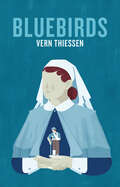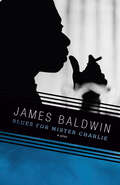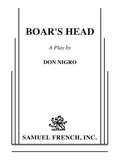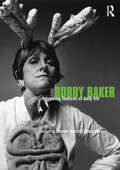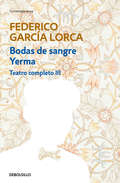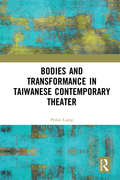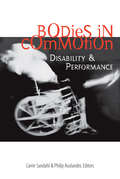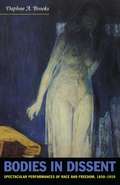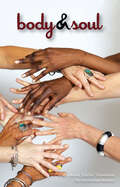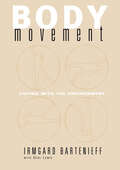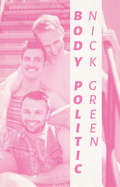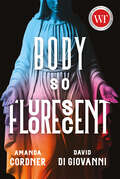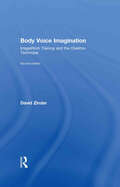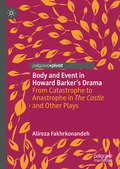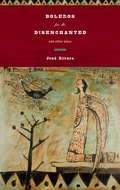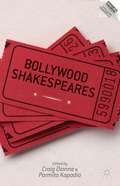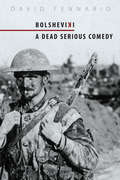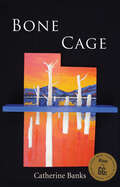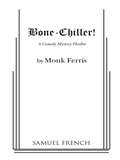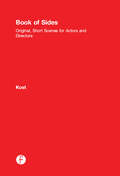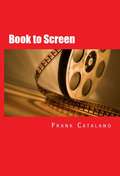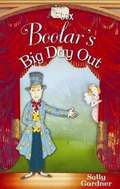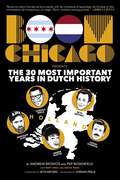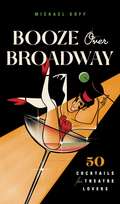- Table View
- List View
Bluebirds
by Vern ThiessenÉtaples, France, 1918. Nurses Christy, Maggie, and Bab have crossed oceans to care for wounded Canadian soldiers in the Great War. Despite the terrible injuries they must deal with, they manage to stay hopeful as the dangers of the front draw closer to their hospital. As each woman becomes accustomed to her duties and patients, they reveal more personal details to one another and through letters to loved ones. Maggie misses her close friend she lived with back home and worries for their future together. Christy writes to her soldier husband, but she knows there’s a difference between the life she should lead with him and the one she wants. Bab longs for what she can’t have: her beloved grandpa, a married soldier, a child. Through it all, the three women find friendship, independence, power, and influence in a place where men, once again, are trying to destroy the world.
Blues for Mister Charlie: A Play (Vintage International)
by James BaldwinAn award-winning play from one of America&’s most brilliant writers about a murder in a small Southern town, loosely based on the 1955 killing of Emmett Till. • "A play with fires of fury in its belly, tears of anguish in its eyes, a roar of protest in its throat." —The New York TimesJames Baldwin turns a murder and its aftermath into an inquest in which even the most well-intentioned whites are implicated—and in which even a killer receives his share of compassion. In a small Southern town, a white man murders a black man, then throws his body in the weeds. With this act of violence, James Baldwin launches an unsparing and at times agonizing probe of the wounds of race.For where once a white storekeeper could have shot a "boy" like Richard Henry with impunity, times have changed. And centuries of brutality and fear, patronage and contempt, are about to erupt in a moment of truth as devastating as a shotgun blast.
Boar's Head
by Don NigroThis big, colorful, uproariously funny and ultimately moving play tells the story of the Shakespearean characters who meet at the Boar's Head Tavern in East Cheap. We see the scenes Shakespeare tells us about but leaves out of HENRY IV, PARTS ONE AND TWO, HENRY V, and THE MERRY WIVES OF WINDSOR, , centering on Doll Tearsheet, her unrequited love for Ned Poins, Ned's sister Nell, impregnated by Prince Hal, and Robin, a girl masquerading as a tavern boy, also in love with Ned. Bardolph, Mistress Quickley, Justice Shallow, Pistol, Jane Nightwork and a host of other characters who live at the edge of Shakespeare move to the center in this play, along with Jack Falstaff and a dead Windmill Keeper who might be Shakespeare himself. The language is rich, the characterizations compelling, and the play has a surprisingly powerful resonance of its own. The latest of Nigro's ongoing investigations of Shakespeare and his worlds. See also LOVES LABOURS WONNE, THE GIRLHOOD OF SHAKESPEARE's HEROINES, THE CURATE SHAKESPEARE AS YOU LIKE IT, THE BOHEMIAN SEACOAST and ARDY FAFIRSIN.
Bobby Baker: Redeeming Features of Daily Life
by Michèle Barrett Bobby BakerBobby Baker is one of most widely acclaimed and popular performance artists working today. Over the course of a thirty-five-year career she has toured the globe with her wildly stimulating explorations of 'Daily Life' and has been extensively written about and studied. This fully-illustrated book brings together for the first time an account of Baker's career as an artist – from her first sculptures at Central St Martins in the early 1970s to her most recent work, 'How to Live' and 'Diary Drawings' – with critical commentary by reviewers and academic practitioners. It includes: Bobby Baker's own 'Chronicle' of her work as artist and performer illuminating critical writing about Baker's shows transcripts of Baker's performances and other original materials reproduced here for the first time significant new essays by Michele Barrett and Griselda Pollock a new interview with Bobby Baker by Adrian Heathfield. Under the guiding editorial hand of distinguished cultural theorist Michèle Barrett, this volume is an essential text for students interested in performance, gender, and visual culture, and a hugely absorbing and accessible account of Baker's work.
Bodas de sangre | Yerma (Teatro completo #3)
by Federico García LorcaBodas de sangre | Yerma es el sexto volumen de la Biblioteca Federico García Lorca y el tercero de los que reúnen su «Teatro completo». En este volumen se ofrecen al lector clásicos lorquianos como Bodas de sangre y Yerma. Asimismo, se incluyen conferencias y charlas ofrecidas por el poeta en torno a sus textos, lo que permite una aproximación aún más personal a su obra. La edición y los prólogos, a cargo de Miguel García-Posada, permiten al lector acercarse a la complejidad de su obra y disfrutar, a lo largo de los siete volúmenes que componen esta Biblioteca Federico García Lorca, de uno de los autores españoles más relevantes del siglo XX. «Una de las finalidades que persigo con mi teatro es precisamente aspaventar y aterrar un poco. Estoy seguro y contento de escandalizar. Quiero provocar revulsivos, a ver si se vomita de una vez todo lo malo del teatro actual.»Federico García Lorca --------------------------------------------------------------------------BIBLIOTECA FEDERICO GARCÍA LORCA Poesía competa:1. Libro de poemas | Primeras canciones | Canciones2. Romancero gitano | Poema del cante jondo3. Poeta en Nueva York | Sonetos Teatro completo:4. La zapatera prodigiosa | Mariana Pineda5. El público | Así que pasen cinco años6. Bodas de sangre | Yerma7. La casa de Bernarda Alba | Doña Rosita la soltera--------------------------------------------------------------------------
Bodas de sangre | Yerma (Teatro completo #Volumen 3)
by Federico García LorcaBodas de sangre | Yerma es el sexto volumen de la Biblioteca Federico García Lorca y el tercero de los que reúnen su «Teatro completo». En este volumen se ofrecen al lector clásicos lorquianos como Bodas de sangre y Yerma. Asimismo, se incluyen conferencias y charlas ofrecidas por el poeta en torno a sus textos, lo que permite una aproximación aún más personal a su obra.La edición y los prólogos, a cargo de Miguel García-Posada, permiten al lector acercarse a la complejidad de su obra y disfrutar, a lo largo de los siete volúmenes que componen esta Biblioteca Federico García Lorca, de uno de los autores españoles más relevantes del siglo XX. «Una de las finalidades que persigo con mi teatro es precisamente aspaventar y aterrar un poco. Estoy seguro y contento de escandalizar. Quiero provocar revulsivos, a ver si se vomita de una vez todo lo malo del teatro actual.»Federico García Lorca --------------------------------------------------------------------------BIBLIOTECA FEDERICO GARCÍA LORCA Poesía competa:1. Libro de poemas | Primeras canciones | Canciones2. Romancero gitano | Poema del cante jondo3. Poeta en Nueva York | SonetosTeatro completo:4. La zapatera prodigiosa | Mariana Pineda5. El público | Así que pasen cinco años6. Bodas de sangre | Yerma7. La casa de Bernarda Alba | Doña Rosita la soltera--------------------------------------------------------------------------
Bodies and Transformance in Taiwanese Contemporary Theater
by Peilin LiangIn Bodies and Transformance in Taiwanese Contemporary Theater, Peilin Liang develops a theory of bodily transformation. Proposing the concept of transformance, a conscious and rigorous process of self-cultivation toward a reconceptualized body, Liang shows how theater practitioners of minoritized cultures adopt transformance as a strategy to counteract the embodied practices of ideological and economic hegemony. This book observes key Taiwanese contemporary theater practitioners at work in forging five reconceptualized bodies: the energized, the rhythmic, the ritualized, the joyous, and the (re)productive. By focusing on the development of transformance between the years of 2000–2008, a tumultuous political watershed in Taiwan’s history, the author succeeds in bridging postcolonialism and interculturalism in her conceptual framework. Ideal for scholars of Asian and postcolonial theater, Bodies and Transformance in Taiwanese Contemporary Theater shows how transformance, rather than performance, calibrates with far greater precision and acuity the state of the body and the culture that it seeks to create.
Bodies in Commotion: Disability and Performance
by Carrie Sandahl Philip Auslander"A testament to the synergy of two evolving fields. From the study of staged performances to examinations of the performing body in everyday life, this book demonstrates the enormous profitability of moving beyond disability as metaphor. . . . It's a lesson that many of our cultural institutions desperately need to learn. " -Martin F. Norden, University of Massachusetts-Amherst This groundbreaking collection imagines disabled bodies as "bodies in commotion"-bodies that dance across artistic and discursive boundaries, challenging our understanding of both disability and performance. In the book's essays, leading critics and artists explore topics that range from theater and dance to multi-media performance art, agit-prop, American Sign Language theater, and wheelchair sports. Bodies in Commotionis the first collection to consider the mutually interpretive qualities of these two emerging fields, producing a dynamic new resource for artists, activists, and scholars.
Bodies in Dissent: Spectacular Performances of Race and Freedom, 1850–1910
by Daphne A. BrooksIn Bodies in Dissent Daphne A. Brooks argues that from the mid-nineteenth century to the early twentieth, black transatlantic activists, actors, singers, and other entertainers frequently transformed the alienating conditions of social and political marginalization into modes of self-actualization through performance. Brooks considers the work of African American, Anglo, and racially ambiguous performers in a range of popular entertainment, including racial melodrama, spectacular theatre, moving panorama exhibitions, Pan-Africanist musicals, Victorian magic shows, religious and secular song, spiritualism, and dance. She describes how these entertainers experimented with different ways of presenting their bodies in public--through dress, movement, and theatrical technologies--to defamiliarize the spectacle of "blackness" in the transatlantic imaginary.Brooks pieces together reviews, letters, playbills, fiction, and biography in order to reconstruct not only the contexts of African American performance but also the reception of the stagings of "bodily insurgency" which she examines. Throughout the book, she juxtaposes unlikely texts and entertainers in order to illuminate the complicated transatlantic cultural landscape in which black performers intervened. She places Adah Isaacs Menken, a star of spectacular theatre, next to Sojourner Truth, showing how both used similar strategies of physical gesture to complicate one-dimensional notions of race and gender. She also considers Henry Box Brown's public re-enactments of his escape from slavery, the Pan-Africanist discourse of Bert Williams's and George Walker's musical In Dahomey (1902-04), and the relationship between gender politics, performance, and New Negro activism in the fiction of the novelist and playwright Pauline Hopkins and the postbellum stage work of the cakewalk dancer and choreographer Aida Overton Walker. Highlighting the integral connections between performance and the construction of racial identities, Brooks provides a nuanced understanding of the vitality, complexity, and influence of black performance in the United States and throughout the black Atlantic.
Body & Soul
by Judith ThompsonIn real and personal stories, these women share their personal stories of triumphs, tragedies, and life's funny moments, while challenging the reader to look beneath the surface of how society views women, especially as they age.Body & Soul was commissioned by Dove as a way to demonstrate that beauty has no age limit.
Body Movement: Coping with the Environment
by Irmgard Bartenieff Dori Lewis"'Irmgard Bartenieff has a profound knowledge of the human body and how it moves. I am delighted that this will now be made available to many more people.'." -- George Balanchine of Director, New York City Ballet"'Irmgard Bartenieff's pioneering work in the multiple applications of Labananalysis has had a transforming influence on many areas of movement training. Her careful and detailed development of the spatial principles into active corrective work has illuminated and altered the training of people as varied as dancers, choreographers, physical therapists, movement and dance therapists, and psychotherapists. Anthropologists and non-verbal communication researchers have found their world view necessarily altered by her fundamental innovations. The field of body/mind work will need to adapt to include her clear working through of basic principles.'." -- Kayla Kazahn Zalk of President, American Dance Guild
Body Politic
by Nick GreenThe point is that we started the conversation. In 1971 Phillip was on the cusp of starting something big. Something that would make history. Now he’s an aging journalist trying to make sense of Grindr. Phillip was a founding member of The Body Politic, a gay-liberation newspaper based in Toronto. As he recounts memories of censorship battles, police raids, historic rallies, and the onset of HIV/AIDS during an intimate encounter with a younger man, their generational differences shine a light on the massive shifts in queer identity and politics over the last fifty years. This historical drama reimagines the events surrounding the birth, life, and death of one of the most important journalistic forces in Canada, and the opportunities it created for the future.
Body So Fluorescent
by Amanda Cordner David Di GiovanniWhat happened last night on the dance floor? Gary knows he went to the club with his friend Desiree, but now all he has is a fuzzy memory and a text saying, “We’re done.” Desiree has known something’s been up with Gary, but she always kept her thoughts to herself. Until last night ended in an explosive fight. As Gary and Desiree retrace their steps to figure out the chain of events, perspectives shift from self to alter ego to untangle the facts. And after the dust settles, can their friendship be rebuilt? Body So Fluorescent is an electrifying exploration that asks difficult questions about Blackness, otherness, and appropriation.
Body Voice Imagination: ImageWork Training and the Chekhov Technique (A\theatre Arts Book Ser.)
by David ZinderFirst published in 2008. Routledge is an imprint of Taylor & Francis, an informa company.
Body and Event in Howard Barker's Drama: From Catastrophe to Anastrophe in The Castle and Other Plays
by Alireza FakhrkonandehThis book explores questions of gender, desire, embodiment, and language in Barker’s oeuvre. With The Castle as a focal point, the scope extends considerably beyond this play to incorporate analysis and exploration of the Theatre of Catastrophe; questions of gender, subjectivity and desire; God/religion; aesthetics of the self; autonomy-heteronomy; ethics; and the relation between political and libidinal economy, at stake in 20 other plays by Barker (including Rome, The Power of the Dog, The Bite of the Night, Judith, Possibilities, I Saw Myself, Fence in Its Thousandth Year, The Gaoler’s Ache for the Nearly Dead, The Brilliance of the Servant, Golgo, among others).
Boleros for the Disenchanted and Other Plays
by José RiveraPraise for José Rivera:"Even if you've never seen Puerto Rico or grown old, you sit there ruminating on love, sacrifice, and betrayal."-Chicago Tribune, on Boleros for the Disenchanted"Teasingly engrossing. . . . Vividly written. . . . An intriguing and evocative drama."-The San Francisco Chronicle, on Brainpeople"Mr. Rivera's intimate play . . . uses historical fact as a frame to pose intriguing questions about what might have happened."-The New York Times, on School of the AmericasThree new works from José Rivera, a writer known for his lush language, open heart, and stylistic flirting with the surreal. Boleros for the Disenchanted is the moving story of the playwrights own parents: their sweet courtship in 1950s Puerto Rico, and then forty years later in more difficult times in America. With Brainpeople, Rivera explores the troubled minds of three women in a post-apocalyptic setting who feast on a freshly slaughtered tiger. In School of the Americas, he imagines Che Guevara's encounter-more passionate than political-with a young schoolteacher in Bolivia. Also included is his one-act penned in protest of California's Proposition 8, Pablo and Andrew at the Altar of Words.José Rivera's works include the plays References to Salvador Dali Make Me Hot, Marisol, Cloud Tectonics, and Sueno (an adaptation of Life Is a Dream), as well as the Oscar-nominated screenplay to The Motorcycle Diaries.
Bollywood Shakespeares
by Craig Dionne Parmita KapadiaHere, essays use the latest theories in postcolonialism, globalization, and post-nationalism to explore how world cinema and theater respond to Bollywood's representation of Shakespeare. In this collection, Shakespeare is both part of an elite Western tradition and a window into a vibrant post-national identity founded by a global consumer culture.
Bolsheviki
by David FennarioSet in a hotel bar in Montreal on Remembrance Day, Bolsheviki has World War I veteran Harry "Rosie" Rollins telling young reporter Jerry Nines about his experience in the trenches. Rollins recalls men pissing their pants, losing limbs, and planning a revolt against their officers. The character of Rosie Rollins is based on World War I veteran Harry "Rosie" Rowbottom, who was wounded at Vimy Ridge. Fennario taped an interview with Rowbottom in 1979 in the old "King Eddy" Hotel in Toronto over a bottle of Bushmills whiskey.Rosie's meandering monologue delivers a blistering de-glorification of war as it shifts back and forth between his wartime recollections and the present. The veteran's clattering, fast-paced description of life-and death-on the Western Front reproduces the chaotic sounds and rhythm of battle. This cutting-edge drama, profoundly in opposition to conventional histories of Canadian troops in World War I, debunks every sentimental notion of duty, heroism, and nationhood. "Birth of Nation" they called it on TV but I didn't see nobody getting born just a lot of people dying so we could sit there on top of another shit hole of mud with Captain Rutherford still pushing for that DSO or the MC or the MCB or the YMCA with Triangles-just give him a medal will ya?Cast of 1 man.
Bone Cage
by Catherine BanksJamie is twenty-two years old and works twelve-hour shifts operating a wood processor, clear-cutting for pulp. At the end of each shift, he walks through the destruction he has created looking for injured birds and animals and rescues those he can. Jamie's desire to escape this world is thwarted by his fear of leaving the place where he has some status.Bone Cage examines how young people in rural communities, employed in the destruction of the environment they love, treat the people they love at the end of their shift. Bone Cage is about the difficulty in growing and hanging on to dreams in a world where dreams are seen as impractical or weak. It is funny. It is tragic. It is about different kinds of escaping. It is about a soul trapped in its own rib cage, a cage of bone, a Bone Cage.
Bone-Chiller!
by Monk FerrisComedy thriller / 5m, 8f or 4m, 9f or 6m, 7f Thirteen people gather on Friday the 13th at the Travers mansion in New York for the reading of Josiah's will which is a wall chart rendered in the form of a rebus (a part word, part drawing puzzle) that almost defies solution. Instead of designating an heir, it offers the estate to anyone who can solve the will! The lights keep going out and people keep getting murdered. The audience will have a ball trying to untangle the puzzle faster than the hapless characters. By the final act, revelations are exploding as surprise piles upon surprise and gasps alternate with howls of laughter.
Book of Sides: Original, One-Page Scenes for Actors and Directors
by Dave KostLooking for fresh, original scenes for your fast-paced acting or directing class? Tired of the same old material everyone recognizes? Want the flexibility to play any character in any scene? Book of Sides: Original, Short Scenes for Actors and Directors offers scenes that are considerably shorter than those in similar books but still feature the structure of typical scenes with arcs, clear playable objectives, and stakes for both actors. Here you will find scenes that are: One-page in length and specially designed for new, high-intensity exercises that help students develop quickly Printed in an easily readable, film-script format that provides plenty of room for annotations Completely original, allowing you to produce and distribute reinterpretations without worrying about copyright restrictions Universally castable, with roles that can be assigned to actors regardless of gender, appearance, skill level, or race Simple and conducive to performing in the classroom without props, costumes, or sets Perfect for audition workshops and crowded directing or acting classes where everyone wants an opportunity to perform Written in accessible, contemporary language that keeps student actors engaged Don’t miss out! In Book of Sides, Dave Kost brings two decades of teaching experience to the table to deliver the ideal set of scenes for busy classroom settings, auditions, and general training.
Book to Screen (How to Adapt Your Novel to a Screenplay #5)
by Frank CatalanoADAPTING YOUR NOVEL INTO A SCREENPLAY BOOK TO SCREEN was first presented as part of the 25th Annual Writer's Conference sponsored by San Diego State University on February 6 through the 8th, 2009 at the Double Tree Hilton Hotel in Mission Hills, California. The following transcript was presented and recorded by Frank Catalano as part of the programs offered at the conference. The book is based partly upon that presentation, focuses on the adaptation of an existing novel into a screenplay for presentation as a motion picture, television program or Internet content. Writers of fiction and non-fiction and industry professionals from the publishing business primarily attended the 25th Annual Writer's Conference. Mr. Catalano's seminars focused upon those writers seeking to adapt their novels into screenplays. The complete list of seminar presentations by Frank Catalano for this conference is: BOOK 1: WRITE GREAT CHARACTERS IN THE FIRST TEN PAGES BOOK 2: WRITING ON YOUR FEET - IMPROVISATIONAL TECHNIQUES FOR WRITERS - Part 1 BOOK 3: START YOUR STORY AT THE END BOOK 4: THE FIRST TEN PAGES BOOK 5: BOOK TO SCREEN BOOK 6: ACTING IT OUT - IMPROVISATIONAL TECHNIQUES FOR WRITERS - Part 2 BOOK 7: WRITE GREAT DIALOGUE
Boolar’s Big Day Out
by Sally GardnerAfter Boolar is asked to join a puppet theater he forgets about the dolls and mice who have been his family, until a crisis helps him regain perspective.
Boom Chicago Presents the 30 Most Important Years in Dutch History
by Andrew Moskos Pep RosenfeldAn exciting history of the improv group you've never heard of that changed comedy in America—this is the story of Boom Chicago in Amsterdam as told by its founders and most famous alumni. "It’s kind of crazy, the impact on culture so many Boom Chicago alums have had. Boom was where I became my best comedic self: the excitement of Amsterdam, the freedom of that environment, the letting loose—it's magic. There's no better training ground." —Jordan Peele "Boom Chicago should have ended up on the scrap heap of 'Terrible Ideas Americans Have While Stoned in Amsterdam.' But when you stubbornly love one thing (comedy) as much as another thing (Amsterdam), you just believe they should be together. And here we are—thirty years later, Boom Chicago is alive and kicking." —Seth Meyers "Working at Boom Chicago was an unbelievable experience. Thank goodness someone was smart enough to write it all down! You're lucky 'cause you get to read about THE most exciting, fun, and illegal time I've ever had!" —Amber Ruffin Featuring interviews with: Meyers, Peele, Ruffin, Jason Sudeikis, Ike Barinholtz, Greg Shapiro, Kay Cannon, and many more; and a sixteen-page, full-color insert with both behind-the-scenes snapshots and images from live performances. What do Ted Lasso, Get Out, Late Night with Seth Meyers, 30 Rock, A Black Lady Sketch Show, Breaking Bad, Saturday Night Live, Girls5Eva, The Colbert Report, Inside Amy Schumer, Pitch Perfect, Key & Peele, The Daily Show, MADtv, Rick and Morty, The Amber Ruffin Show, Horrible Bosses, Portlandia, It's Always Sunny in Philadelphia, Suicide Squad, Superstore, How I Met Your Mother, Wicked, The Pee-Wee Herman Show, Brooklyn Nine-Nine, and Broad City all have in common? They all feature writers, creators, directors, or stars who got their start at Boom Chicago. Having risen roughly to the middle of Chicago's cutthroat comedy scene, Andrew Moskos and Pep Rosenfeld decamped the Midwest for Amsterdam, Netherlands in 1993 to start their own improv comedy troupe, Boom Chicago. In a foreign land with zero tradition of English-language humor, Moskos and Rosenfeld unwittingly created the finishing school for some of today's most groundbreaking comedic talents. They (along with coauthors Matt Diehl and Saskia Maas) document this journey in the definitive oral history Boom Chicago Presents the 30 Most Important Years in Dutch History. From its stages, Boom Chicago went on to launch cultural game changers like Seth Meyers, Jordan Peele, Amber Ruffin, Jason Sudeikis, Brendan Hunt, Ike Barinholtz, Kay Cannon, and Tami Sagher (and that's just a partial list). At Boom, these young upstarts honed their craft in front of unsuspecting foreign audiences and visiting dignitaries like Burt Reynolds, Run-DMC's Jam Master Jay, Dutch royalty, and the Netherlands's prime minister—all while navigating a world with legal weed and prostitution, annual holiday celebrations involving blackface, cookies with weird racist names, and football that has nothing to do with the NFL. From this culture shock, this collective created a more topical, inclusive, tech-savvy humor that would become the dominant comedy style of our time. Praise for Boom Chicago: "The Groundlings. The Harvard Lampoon. Second City. These comedy institutions have been supplying Hollywood with a steady stream of talent for decades. Well, there's another name—almost as influential—that you've never heard of: Amsterdam's Boom Chicago. Huh?"—G.Q. "A small theater in Amsterdam became the most influential American comedy factory you've never heard of . . . Boom alums have had a significant hand in many of the shows that defined the past two decades of comedy." —New Yor
Booze Over Broadway: 50 Cocktails for Theatre Lovers
by Tiller PressEnjoy a delicious cocktail while belting out Broadway tunes with this witty guidebook that perfectly pairs your favorite showtunes and Broadway musicals with innovative libations.Do you have a strong love for Andrew Lloyd Weber or Stephen Sondheim? Do you consider &“Defying Gravity&” to be the ultimate, underrated karaoke song? Then get ready to raise your glass and belt out that high-C with Booze Over Broadway. Featuring 50 delectable drinks from a rising star in the New York City bar scene, this clever and creative manual allows you to make delicious cocktails right from the comfort of your home. This witty, accessible book also includes commentary, step-by-step instructions, and whimsical illustrations throughout. Recipes include: -Hello, Daquiri! -The Best Little Whiskey Sour in Texas -Don&’t Cry for Me, Appletini -I Don&’t Know How to Love Gin -Bloody, Bloody, Mary Jackson -Once on this (Long) Island Iced Tea -Brandy Alexander Hamilton -If I Were a Rich Man(hattan) -And more! Fresh and fun, Booze Over Broadway will have cocktail connoisseurs and Broadway buffs alike screaming &“encore!&” (and &“cheers&”).
